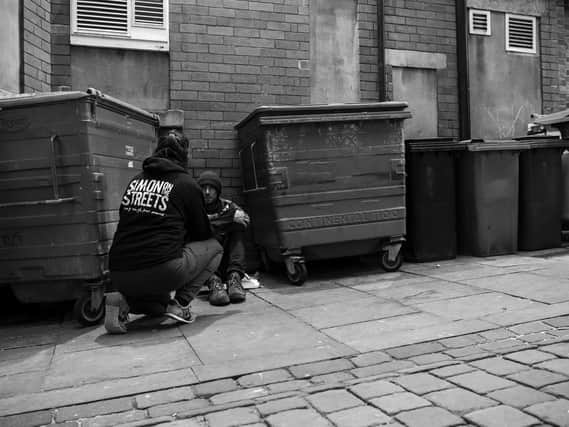How Yorkshire charities have helped homeless and vulnerable people through coronavirus pandemic


Jason was a young man who found himself sofa-surfing as the coronavirus pandemic took hold in the UK. Though it wasn't for the first time, this time was different.
“Sofa surfing with friends became much harder with Covid-19,” he explains, “because people – even friends – would turn me away, worried about the virus because I had been mixing with people with no settled place to stay.”
Advertisement
Hide AdAdvertisement
Hide AdJason, who requested to be referred to only by his first name, presented as homeless at his local housing hub.


He was referred to SASH, a charity that works to prevent homelessness in young people aged 16 to 25 throughout North and East Yorkshire, by giving them a safe place to stay with one of its network of volunteer hosts in the region.
Its emergency accommodation service, Nightstop, sees young people given a bed for the night in a host's house, a hot meal and a shower. The next day, they return to the agency that referred them to SASH, the trading name of Safe and Sound Homes, and the organisations work together night-by-night until the individual has somewhere permanent to stay.
For some, that could mean returning home, for others, it's finding private rented accommodation, moving into local authority housing or staying with the charity’s Supported Lodgings service.
Advertisement
Hide AdAdvertisement
Hide AdThe latter is for those who cannot go back home and do not know how to live alone and sees them placed with a host for up to two years. There they learn to budget, shop, cook and clean in order to live an independent life, as well as accessing support to get into college, work or training if needed.
Whilst placed with a SASH host, Jason received an offer to study English Literature and Creative Writing at university. “Being in SASH means I can plan ahead and think about a positive future,” he says. “Being [with my host] means that I have stability and don’t have to worry about where I will stay each night. My mental health has improved a lot, knowing that I have my own space.”
Laura Smith, a host coordinator for the charity in York and Selby, says the pandemic hasn’t stop young people moving in to Supported Lodgings hosts.
“It has been really heartwarming because at a time when a lot of people weren’t even able to see their own families, we had people willing to take in new young people who were essentially strangers to them."
Advertisement
Hide AdAdvertisement
Hide AdThe shared experience of living through an unprecedented period has, in some cases, strengthened relationships between hosts and young people. One host, for example, who took a young person into his household during lockdown, said being “in at the deep end...accelerated getting to know each other and we have viewed it as a positive”.
Kallum Taylor, a Nightstop team leader, says there were fewer referrals to the emergency accommodation service during the height of the lockdown, but observes that many of the young people the charity worked with were deemed to be in “high need”.
“In ‘normal’ times, we get the full spectrum of awful home lives, substance misuse, nasty relationship breakdowns, and we also get people who might have just missed out on their grades to get into uni who all of a sudden find themselves facing rough sleeping. Over lockdown, it’s been a concentration of more challenging and severe cases.”
Perhaps one reason, Kallum speculates, is that where problems have been ‘less severe’, families and friends have gone the extra mile to prevent people presenting as homeless, given the coronavirus circumstances. But in some cases, with people cooped up indoors, the pressure of the situation has been hard to stand.
Advertisement
Hide AdAdvertisement
Hide Ad“There’s been a few referrals where what in ‘normal’ times might have been a typical weekly argument that has got a bit fraught, has in some cases been the straw that has broken the camel’s back for certain households. In some cases, it’s increased people’s tolerance to one another, but in other cases, it’s probably reduced it and meant that the family system is less likely to withstand any difficulties.”
Whilst, understandably, some of the charity’s hosts have stepped back due to health issues and concerns around the virus risk, SASH has yet to turn anyone away due a volunteer not being available.
But, Laura observes, “stagnation in the housing system” means a number of young people at the end of their Supported Lodgings placements have been unable to move on from their hosts to independent living. “More than ever we need more hosts. We’re at a danger of running a waiting list. We are at capacity and needing more.”
Recruiting and maintaining hosts will also be “crucial”, Kallum says, in managing an expected influx in demand. The charity is running an emergency appeal that aims to raise £50,000 - the cost of running Nightstop for three months - predicting an increase in need for its services, at a time when its income has been hit as fundraising events have been cancelled.
Advertisement
Hide AdAdvertisement
Hide AdExplaining more about the thinking behind the Life After Lockdown campaign, digital lead, Thea Burden, says: “In the most severe part of the lockdown, families were putting up with more, trying to keep people in. As lockdown eases and we go back to more of a normality, those issues don’t go away, they’re still simmering away, and those family breakdowns will still happen and someone needs to be there.”
Economic pressures that come with the country being in recession are also likely to impact, Laura adds. “Sometimes young people who access Nightstop are also there because their families can’t afford to keep them. That’s a horrible thing people don’t want to hear, but if young people aren’t able to work and aren’t able to contribute towards the house at all, then their families simply can’t afford to keep them. A lot of people are out of work, a lot have been made redundant, so there’s going to be another wave of pressures.”
Natalie Moran, the CEO of Simon on the Streets, says she too is concerned about what is to come.
The West Yorkshire charity, which helps homeless and vulnerable people in Leeds, Bradford and Kirklees, has been supporting people who were rough sleeping and housed in emergency accommodation as part of the Government's 'everyone in' scheme at the height of the pandemic.
Advertisement
Hide AdAdvertisement
Hide AdWhen they were allocated hotel and B&B provision, Natalie says the situation provided the charity with an opportunity to engage with some individuals who can be difficult to reach.
“What did happen with Covid-19 was a lot of hidden homeless came to the fore,” she says. “People who had been sofa surfing got kicked out, people who had been getting cash in hand work, that employment ended, so we started to see more people who we hadn’t met before.”
The charity has been helping people to access services and supporting them to move on into new longer-term accommodation. Those it has worked with include people who were placed in a women’s only hotel in Leeds and individuals who have no recourse to public funds, a condition applied to people staying in the UK with a temporary immigration status.
“The uptake in engagement has been phenomenal,” says Natalie, of the former group. “These are women that are very complex, very chaotic and we’ve seen some amazing successes, people coming off drugs, not sex working, getting clean, getting back into treatment.”
Advertisement
Hide AdAdvertisement
Hide AdAs for the latter? “Because we’ve had people in one place and because they’ve had their basic needs met with accommodation, the engagement of those clients with us has been massive and we’ve seen some real successes with people being moved on and some getting settled status meaning they can access employment and benefits and their own independent accommodation. As much as Covid has been horrendous, there have been some really good outcomes.”
With people not having had to worry about finding a bed and food for the night, she says many individuals have been much more willing to work with services. It has not been the case for everyone though, and for some of those now so sadly-accustomed to life on the streets, it took time, Natalie says, to get used to looking after a hotel room and making the most of opportunities for personal care.
“There have also been challenges with some clients who are very frightened and quite anxious about coming into somewhere like these hotels, which are quite busy, Some have needed more wraparound support having gone from being on the streets on their own, not part of a group, and then being surrounded by people, some of whom they might not want to mix with.”
“There was also an assumption that everybody knew what was happening with Covid,” she adds. “It was on the news, everywhere, but for a lot of this group of people, they weren’t that educated on some of it. We spent a lot of time giving education on the virus itself, how they needed to look after themselves, giving out hand gel and sanitiser.”
Advertisement
Hide AdAdvertisement
Hide AdThough work to move people on from emergency accommodation to something more long-term began in the early days of lockdown, with several success stories, Natalie says the period is a difficult one and she believes the charity's services will be needed more than ever over the next 12 months.
“[It’s difficult] mainly because of a lack of social housing and being able to meet the individual needs of those who have been temporarily accommodated.
“There is also the issue of evictions looming. We are already seeing an increased number of clients contacting us worried that they will soon be evicted by private landlords.
“The eviction ban has recently been extended for four weeks, however unless legislation changes in this time and more support is made available such as access to loans to cover arrears, then we will see a new wave of homelessness.”
Advertisement
Hide AdAdvertisement
Hide AdOne of Simon on the Street’s Kirklees outreach workers highlights the concerns of a man who was living on the streets and placed in a hotel as lockdown began.
“He told me it was the best thing to have happened to him...He can keep himself clean and presentable. Most importantly he is able to sleep well and feels very safe as the hotel has cameras and twenty four hour staffing. He says his mental and physical health have improved enormously. He feels like he has been given a lifeline.
“Recently though he has started to become increasingly anxious about his future and is worried where he will be placed once his time at the hotel ends. He is fearful he will end up back to square one.”
Natalie is hopeful that work during the pandemic to engage some of society’s most vulnerable individuals will continue to be built on. “We’ve never had a situation like this and we’ve never been able to grab hold of all those people who have potentially had years and years on the streets, who are so hard to engage and work with.
Advertisement
Hide AdAdvertisement
Hide Ad“What we don’t want to go back to is anybody being able to do that again. If someone comes through and ends up homeless, we want to be picking them up straight away and use the learning we have to help them.”
Visit simononthestreets.co.uk and www.sash-uk.org.uk to support the charities.